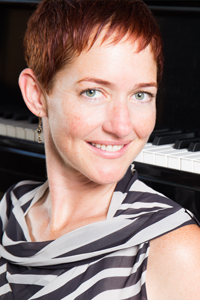Rebecca Cline
For media inquiries, please contact Media Relations
Born and raised in the southeastern United States, Rebecca Cline has lived in Boston since 1999. After graduating from the University of North Carolina in 1994 with a Bachelor of Arts degree in Latin American Studies and a minor in music, she spent several years living and traveling in Cuba, Brazil, Ecuador, and Puerto Rico. She earned a Bachelor of Music degree from Berklee College of Music in 2001.
Currently a professor at Berklee, Cline has taught Latin jazz and mixed-styles ensembles, Cuban piano classes, and jazz studies at the college since 2003.
She is the author of Latin Jazz Piano: Clave, Comping and Soloing, published by Berklee Press. She has traveled independently and with Berklee to conduct workshops in Asia (Malaysia and China), Europe (Italy and Spain), South America (Brazil and Ecuador), and the Caribbean (Puerto Rico and the Dominican Republic). She performs regularly with the Rebecca Cline Trio, and has performed and recorded with the band Mango Blue for more than a decade.
- Member of Rebecca Cline Trio and Mango Blue
- Performed with Pedrito Martinez, Giovanni Hidalgo, Horacio “El Negro” Hernandez, Jerry González, and Steve Nelson
- Author of Latin Jazz Piano Improvisation: Clave, Comping, and Soloing (2013)
- Recorded three CDs: Mango (2010), Enclave Diaspora (2008), and Enclave (2003)
- Studied with Charlie Banacos (2001–2005) and Chucho Valdés (1996)
- Chamber Music America, New Jazz Works commission (2007)

